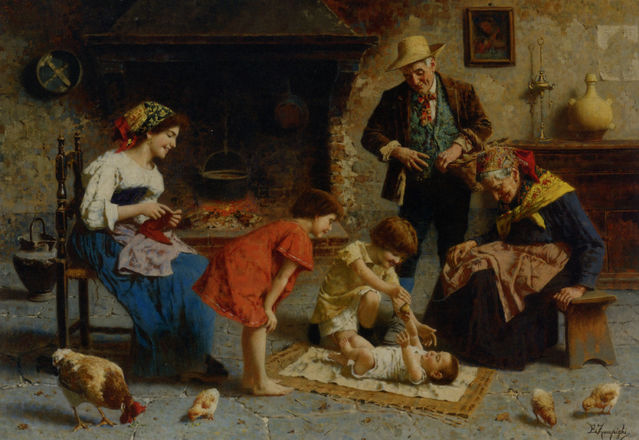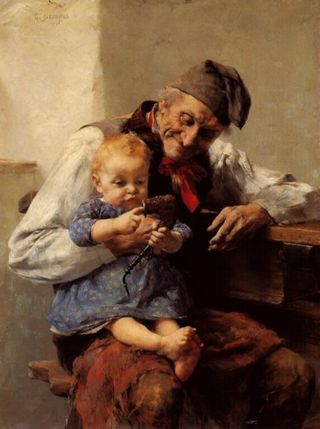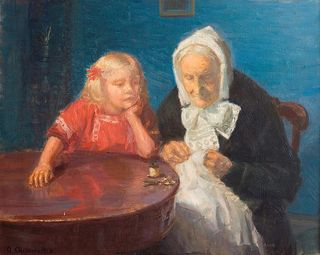Wisdom
Which Kind of Grandparent Will I Be?
We demonstrate a variety of styles in how we relate to our children's children.
Posted March 13, 2018

We relate to our children's children in many ways and for many reasons. Our grandchildren carry our DNA and maybe our values, experiences, achievements, or more subtle influence into the future. They are our earthly immortality - one kind of immortality anyway. Not everyone thinks of them that way. To be frank, it is a bit of a self-centered way of viewing them, I must admit as someone who nevertheless feels that way. There's so much, much more to them. They are their own people. Maybe they carry something of us into the future, but it's still their future.
My first grandchild was born a month ago, which surprises a lot of people who don't think I look old enough (or so they say). My own grandfather is pretty darned pleased to know that the family's next generation has begun. Will I relate to my grandson the way my grandfathers related to me, or will I be completely different? I'm truly fortunate to have a grandfather at this age, much less have made it into my forties while I still had all four grandparents. The family has a history of marrying young and living long.
So what kind of grandparent will I be? Even though I'm about to look at which kind, I really wonder "what kind" rather than "which kind" because my concern is not really about fitting into a type or group. What will I be to this child? Who will I be in his world? I hope that I will be someone who truly matters in this little boy's life.
Researchers who have attempted to identify grandparenting styles have generally done so based on quality, frequency, complexity, and authority of grandparent/grandchild interactions. Neugarten and Weinstein (1964) loosely characterized three main styles: distant, formal, and fun-seeking. They also reported two other styles which they considered to be fairly gender-specific: grandmother sometimes as surrogate parent and grandfather sometimes as reservoir of family wisdom. (That was 1964, after all, and their study was heavily skewed in studying middle class, nuclear families with married parents and multiple grandparents.)

- The distant grandparent, though benevolent, is not around the child much. Contact is infrequent, typically at holidays or specific family gatherings. These days, of course, contact is about more than mere physical distance when people can conduct entire and meaningful relationships via social media and FaceTime. That distant grandparent is not me. I'm a four- or five-hour drive away, not close enough to be around every week but close enough for frequent contact. Not that proximity is the only issue. A distant grandparent could live down the street. Still, I know I'll be more involved than that. Hey, I was the first person to babysit the little guy right after he got home from the hospital and his weary parents needed to nap.
- Formal grandparents are interested in the child's life without being intrusive. They abide by their expected roles, providing some childcare assistance or related services while not becoming overly involved. I certainly hope I'll be more involved just as I remain close to my sons and involved in their lives, and I don't like to think of myself as being particularly traditional or formal. Still, I want to make sure I'm reinforcing the parents' choices without intruding. When one of my students asked if I was going to let my grandson watch certain types of movies, I said, "It's not up to me."
- The fun seeker is informal and playful. The fun-seeking grandparent wants to do more than simply provide the grandchild with a good experience, but wants them to have fun together. I hope we will have a lot of fun together. I want to be tremendously silly when the grandchild is little and adapt to having other kinds of fun while he grows up. My grown sons and I have fun together, and I hope for something like that. Admittedly, there is a formal aspect to it, too, because I've never been "just" their friend. If you're only a friend to your children when they're small, they won't actually feel as safe or protected in the world. You more easily have the option of being your grandchild's buddy. Truly supporting the parents, though, will sometimes mean getting serious, too. So while I think I'll be more fun-seeking than formal, there will still be a touch of the formal while I try to reinforce the way his parents are bringing him up.

- The surrogate parent, as identified by Neugarten and Weinstein, assumes a great deal of childrearing responsibility. I don't foresee that happening. He already has great parents right there in his life and will not need a surrogate.
- Much as I like the idea of being a source of wisdom, skills, and resources, the reservoir of family wisdom described by Neugarten and Weinstein is rather authoritarian. Even as a parent, I'm authoritative, not authoritarian, and I certainly don't like the idea of taking on an authoritarian head of the clan kind of role. My wife and I encouraged our sons to be more rebellious and assertive than that.
These distinctions may mean less in the 21st century than they did at the time. Culturally determined gender roles have shifted, some expectations have expanded while others narrowed, and the "traditional family" is recognized as meaning so much more than many people have thought at times. To be fair, Bernice Neugarten and Karol Weinstein acknowledged that people are more complicated than simple categories might suggest, and they recognized the family structure was changing then as they indicated with their article's title ("The Changing American Grandparent").
Like just about any other system of classifying people, this is simply a model for looking at the great variety of human behavior and experience. We defy the efforts to describe us individually even as we seek to describe and define the world around ourselves. When the day comes that my grandson or grandchildren might describe me to others, I hope I'm not that easy to explain. I hope I mean something more to him or them when the time comes. I think there's much more to me than "He really likes Batman."
References
Neugarten, B. L., & Weinstein, K. K. (1964). The changing American grandparent. Journal of Marriage & the Family. 26(2), 199-204.


